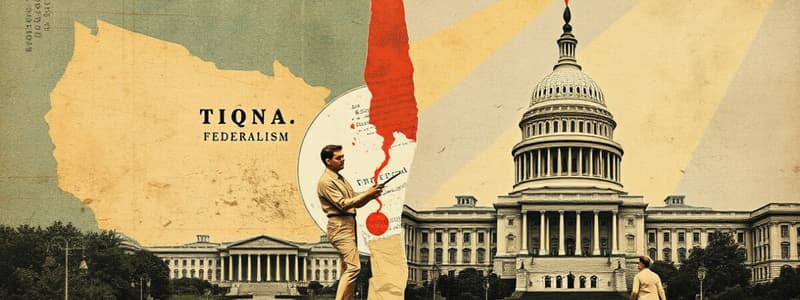Podcast
Questions and Answers
Which one of the following forms of fiscal federalism allowed the states their broadest financial discretion?
Which one of the following forms of fiscal federalism allowed the states their broadest financial discretion?
- Categorical Grant
- Revenue Sharing
- Matching Grant
- Block Grant (correct)
What system of federalism allows states to do the most fundamental governing?
What system of federalism allows states to do the most fundamental governing?
Dual Federalism
What examples illustrate the powers granted to Congress by the constitution?
What examples illustrate the powers granted to Congress by the constitution?
Enumerated Powers
Which form of federalism would least likely be favored by states?
Which form of federalism would least likely be favored by states?
Enumerated powers are given to which level of government?
Enumerated powers are given to which level of government?
What was ruled in the case of McCulloch v. Maryland?
What was ruled in the case of McCulloch v. Maryland?
What does dual federalism refer to regarding the constitution?
What does dual federalism refer to regarding the constitution?
In which case was the power of national government to regulate interstate commerce expanded?
In which case was the power of national government to regulate interstate commerce expanded?
What notion explains that when state and federal laws conflict, national laws prevail?
What notion explains that when state and federal laws conflict, national laws prevail?
What type of government was developed by the founding fathers after prevailing against a unitary form?
What type of government was developed by the founding fathers after prevailing against a unitary form?
What levels of government are recognized specifically in the constitution?
What levels of government are recognized specifically in the constitution?
What does federalism as a form of government help accommodate?
What does federalism as a form of government help accommodate?
What happens when national policies override state policies in case of a conflict?
What happens when national policies override state policies in case of a conflict?
What is a major basis for congressional power?
What is a major basis for congressional power?
What constitutional provision makes same-sex marriage controversial?
What constitutional provision makes same-sex marriage controversial?
What do both national and state governments have the power to establish?
What do both national and state governments have the power to establish?
The constitution provides for the power of extradition. What is this an example of?
The constitution provides for the power of extradition. What is this an example of?
What is a power given to the national government?
What is a power given to the national government?
What is an example of concurrent powers?
What is an example of concurrent powers?
Flashcards
Block Grants
Block Grants
Financial grants given to states with broad guidelines on how to use them.
Dual Federalism
Dual Federalism
A system where states have most governing power, independent of the national government.
Enumerated Powers
Enumerated Powers
Powers explicitly granted to the national government in the Constitution.
The Supremacy Clause
The Supremacy Clause
Signup and view all the flashcards
McCulloch v. Maryland
McCulloch v. Maryland
Signup and view all the flashcards
Gibbons v. Ogden
Gibbons v. Ogden
Signup and view all the flashcards
Federalism
Federalism
Signup and view all the flashcards
Unfunded Mandates
Unfunded Mandates
Signup and view all the flashcards
Concurrent Powers
Concurrent Powers
Signup and view all the flashcards
Necessary and Proper Clause
Necessary and Proper Clause
Signup and view all the flashcards
Full Faith and Credit Clause
Full Faith and Credit Clause
Signup and view all the flashcards
Extradition
Extradition
Signup and view all the flashcards
Accommodating Diversity
Accommodating Diversity
Signup and view all the flashcards
States' Rights
States' Rights
Signup and view all the flashcards
Commerce Clause
Commerce Clause
Signup and view all the flashcards
Interstate Commerce
Interstate Commerce
Signup and view all the flashcards
Study Notes
Fiscal Federalism and Government Powers
- Block grants provide states with considerable financial discretion, allowing for flexibility in funding specific programs.
- Dual federalism enables states to exercise the majority of fundamental governing powers independently of the national government.
Constitutional Powers
- Enumerated powers are specifically granted to the national government, including the establishment of post offices and the construction of roads.
- The Supremacy Clause asserts that when federal and state laws conflict, federal laws take precedence.
Judicial Cases Impacting Federalism
- The McCulloch v Maryland case established crucial precedents for federal powers, reinforcing both the necessary and proper clause and the supremacy of national authority.
- Gibbons v Ogden expanded the national government’s power to regulate interstate commerce, defining the scope of the Commerce Clause.
Government Structures and Relationships
- Federalism consists of two primary levels of government: national and state, each with distinct functions outlined in the Constitution.
- Unfunded mandates represent federal requirements imposed on states without allocated funding, which are typically less favored by state governments.
Intergovernmental Relations
- The concept of concurrent powers allows both national and state governments to exercise certain powers, such as taxation and establishing court systems.
- The full faith and credit clause raises questions regarding the recognition of same-sex marriage across state lines.
Legal Framework and Powers
- The necessary and proper clause (elastic clause) is the constitutional foundation for implied powers, allowing Congress to enact laws beyond those explicitly enumerated.
- The power of extradition exemplifies interstate relations by allowing states to request the return of individuals accused of crimes.
Accommodating Diversity
- Federalism serves to accommodate regional differences among states, promoting localized governance that reflects community values and needs.
Studying That Suits You
Use AI to generate personalized quizzes and flashcards to suit your learning preferences.
Description
Test your knowledge on fiscal federalism, dual federalism, and enumerated powers with these flashcards. This quiz covers essential concepts that shape the relationship between federal and state governments.




